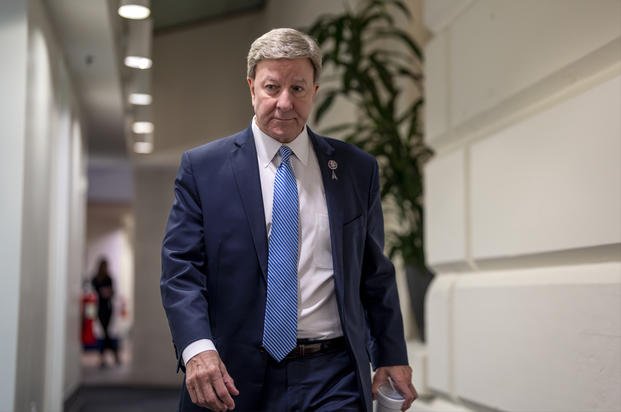Leading lawmakers are signaling they want to infuse even more cash into military quality-of-life improvements than the Pentagon asked for in its annual budget request unveiled on Monday.
But they are running into the reality that spending caps they previously agreed to could force Congress to make tough tradeoffs in the defense budget.
The Pentagon's budget request includes $850 billion for fiscal 2025. Among the quality-of-life funding included in the request is money for a 4.5% pay raise for troops, $2.35 billion for Army barracks and $250 million for Navy and Marine Corps barracks.
Read Next: Supply or Die: Sustaining Marines in the High North so They Can Fight and Win a Future War
House Armed Services Committee Chairman Mike Roger, R-Ala., told Military.com on Tuesday that he believes the administration's funding request for military quality-of-life issues is inadequate to reverse years of declines and that his committee will look to "beef it up" when it writes its annual defense policy bill in the coming months.
Still, Rogers acknowledged that he hasn't "figured out how he's going to balance it" with the budget caps.
The release of the Pentagon budget request now moves the action to Congress, which will ultimately decide exactly how much money to spend and where. While the debate over fiscal 2025 is starting, lawmakers still haven't approved fiscal 2024 spending for about half of the government, including the Pentagon, nearly six months after the fiscal year started.
The requested pay raise for 2025 matches what troops are entitled to under a law that ties the annual raise to an economic indicator known as the Employment Cost Index. Lawmakers typically rubber-stamp pay raise requests.
The Pentagon's budget request fits within the Biden administration's overall national security budget request for $895 billion.
That number complies with the budget cap that lawmakers agreed to in a deal last year to limit government spending for fiscal years 2024 and 2025 in exchange for avoiding a U.S. debt default -- an issue that has recently led to numerous high-profile showdowns and political brinkmanship on Capitol Hill that threatened the economy.
But defense hawks -- most of whom voted in favor of the agreement that included the caps -- are bristling at the budget request, casting it as anemic in the face of global threats.
In a statement Monday, Rogers, who voted for the cap agreement, lamented that the defense budget "fails to keep pace with inflation and our adversaries," even as he acknowledged it complies with the earlier budget deal.
Much of the GOP criticism of the budget has centered on weapons buying and the fact the budget asks for fewer major platforms than the Pentagon had projected it would request a year ago.
The focus on hardware raises the prospect that quality-of-life funding could be competing for more weapons funding when lawmakers write their bills.
Rep. Don Bacon, R-Neb., who chairs the House Armed Services Committee's military quality-of-life panel, raised the possibility that the committee could go over the caps when it writes its annual defense bill.
"We can't have failing dorms and people on SNAP in the military," said Bacon, using the acronym for the program colloquially known as food stamps. "But you just can't take it out of F-35s and B-21s and ships, too. So I think it's a discussion that we need to have."
Bacon's panel, which held two open hearings and several closed-door briefings on housing, pay, child care, spouse employment and health care over the last year, is expected to release its recommendations to improve those areas in the coming months. The price tag for the recommendations could be about $5 billion, he said Tuesday.
While Bacon said he didn't think the administration's overall budget request was sufficient for military quality-of-life issues, he commended the Army for significantly bulking up its request for barracks funding.
"They are putting their attention on it," he told Military.com. "I think they were embarrassed. When you get an F, you got to fix it."
Speaking to Military.com ahead of the budget's release, the top Democrat on the military quality-of-life panel, Rep. Chrissy Houlahan of Pennsylvania, said one of her main takeaways from the panel's work is the need for sufficient funding.
"I don't think you'd call it a revelation, but I think that the end result of these pillars that we're going to be investing in is that we have to actually invest in them," she told Military.com in an interview last week in her Washington, D.C., office. "We can't pay them lip service. We have to put dollars behind this."
But making those investments while adhering to budget constraints could prove difficult. After the budget's release, some top Democrats suggested they could tinker with the line items but would ultimately adhere to the budget cap agreement.
"President Biden has proposed a defense budget that protects the American people, strengthens our defense industrial base, and aligns with the national security and fiscal challenges we face while adhering to the contours of the debt ceiling agreement Republicans demanded," Senate Armed Services Committee Chairman Jack Reed, D-R.I., said in a statement Monday. "We must keep our commitment to our servicemembers and their families, and wisely balance resources to modernize our military with the right capacity and capabilities."













